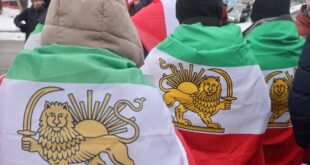By weaponising gas exports, Putin is digging the grave of Russia’s economy.
On Wednesday, Russian President Vladimir Putin escalated the geo-economic war between his country and the West by suspending gas deliveries to Poland and Bulgaria, citing the two countries’ refusal to pay in Russian roubles.
The move, decried by the West as “blackmail”, yet again demonstrated Putin’s belief that Russia’s status as a commodities exporter will enable it to withstand and counter the crippling sanctions imposed on its economy since its invasion of Ukraine.
In reality, however, Putin’s move is akin to brining a knife to a gunfight.
The decision to suspend gas deliveries to two European nations will not only fail to strengthen the Russian economy, but it will significantly increase the Kremlin’s long-term economic losses.
But to understand why Putin’s move will not deliver the desired outcome, we first need to look at his motivations for making it.
Sanctions have cut Russia off from foreign exchange reserves worth hundreds of billions of dollars, Russian imports are cratering amid restrictions on dual use and computer technologies, and Western firms are pulling out from Russia or “self-sanctioning” by refusing to sell goods there.
Putin, however, still appears to be under the impression that he can win the economic war being waged over his invasion of Ukraine. On the surface, it seems like there is some reason for the confidence the Russian state displays: the rouble has more than recovered its value from before sanctions were introduced, hitting a two-year high against the Euro on April 27, and Russia is once again growing its foreign currency holdings on the back of sky-high hydrocarbon prices.
All this, of course, belies the real state of the Russian economy. First of all, the interruptions to supply chains caused by sanctions are crippling Russia’s production capacities. In March, for example, there was a whopping 72 percent drop in passenger car production in the country. The Kremlin is also all but certain to formally default on its foreign debts in the coming days, which will make financing a future rebuilding of the economy extremely difficult. Moreover, Russian wealth abroad is increasingly under threat and the much celebrated exchange rate recovery has only been achieved thanks to extreme capital controls.
The Central Bank of Russia and Putin’s advisers in the finance and economy ministries know that the rouble sustaining its value is overwhelmingly dependent on hydrocarbon prices and continued Russian state control over trading. They are also wary of how much rouble liquidity has already decreased in light of the existing sanctions on Russia’s banking system. As Putin’s brutal war on Ukraine continues, sanctions are expected to expand. Washington has warned that it may still cut off rouble convertibility entirely and there is no significant Western demand for roubles.
This is precisely why Putin has ordered European gas firms to pay for the natural gas they buy from Russia in roubles. Payments for gas in the local currency would leave the window open for rouble convertibility – something the Kremlin desperately needs given oil prices are unlikely to remain so elevated permanently.
At the moment, the global financial system runs on the US dollar, and the Kremlin is aware of this. But as Russia’s Security Council Secretary Nikolai Patrushev said in an April 26 interview with state media, Russia is now working to create a “dual loop monetary and financial system” in which the rouble would be backed by both gold and commodities “to put the rouble exchange rate in line with real purchasing power parity”. Russia forcing Europe to pay for gas in roubles is just one part of this major plan.
But there is little reason to believe this plan with work – with or without rouble payments for gas from Europe.
The Soviet Union already tried to do this – including a brief “gold rouble” period in the early 1920s – and, despite all their ideological fervour, they could not make it work. The attempt is much less likely to succeed in Putin’s ideologically bereft state.
Putin is weaponising his country’s gas supplies, and foregoing the profits that could be earned by selling at spot to Poland and Bulgaria – which have refused to renew contracts – to demonstrate the seriousness of his rouble demand.
Some European gas companies have already capitulated – four European gas companies have reportedly already made payments in roubles and others are preparing to do so, including Italy’s ENI, despite European Union warnings.
This could be seen as a Russian victory. But even if EU unity does collapse over the issue and gas payments ensure that the rouble’s convertibility remains in place for now, Putin is overplaying his hand.
Moscow had been receiving accolades for acting less overtly political in European supply and pricing markets before its invasion of Ukraine. It was seeing beneficial EU reforms, arbitration court rulings and market liberalisation. The Nord Stream 2 Baltic Sea gas pipeline project, designed to double the flow of Russian gas direct to Germany, was under way.
However, Russia’s aggression in Ukraine changed all this and Berlin cancelled the pipeline project in response to Russia’s recognition of its proxies in Donetsk and Luhansk on the eve of the invasion.
Of course, Europe will remain dependent on Russian gas for at least one to two years. But Putin’s actions have already spurred a search for alternatives – including the Baltic Pipeline linking Norway and Poland that is expected to be competed later this year. All this will only accelerate in light of his move to suspend gas deliveries to Poland and Bulgaria, which permanently put to rest the idea that Russia will not weaponise its gas exports.
The EU could increase LNG imports from sources other than Russia by nearly 70 billion cubic metres this year – reaching more than 40 percent of what it received from Russia. Maximising production at the Dutch Groningen gas fields and working with Azerbaijan and Algeria (as well as Turkey and Morocco, through which key pipelines run) could further help address the shortfall.
Before the Ukraine war, Europe had little motivation to swiftly reduce its dependence on Russian gas. But Putin’s own actions – first the illegal invasion of Ukraine and then the overt weaponisation of gas exports – created the political will to address the issue.
Putin is teaching Europeans that interdependence between Russia and the West has failed as a strategy. But his economy remains a one-trick pony, dependent on commodities and stuck responding to sanctions rather than striking its own serious blows.
A lesson for Putin can be found in what is known as “Healey’s Law” (named after Denis Healey, the British chancellor who himself experienced the difficulty of resetting a country’s finances when he negotiated an IMF Bailout in 1976): “Follow the rule of holes; if you are in one, stop digging.”
As for Europe, Healey’s law contains a corollary that applies: “When your opponent is in a hole, why would you want to take away his shovel?”
Putin may have scored a short-term victory, but he is digging the grave of Russia’s economy.
 Eurasia Press & News
Eurasia Press & News




